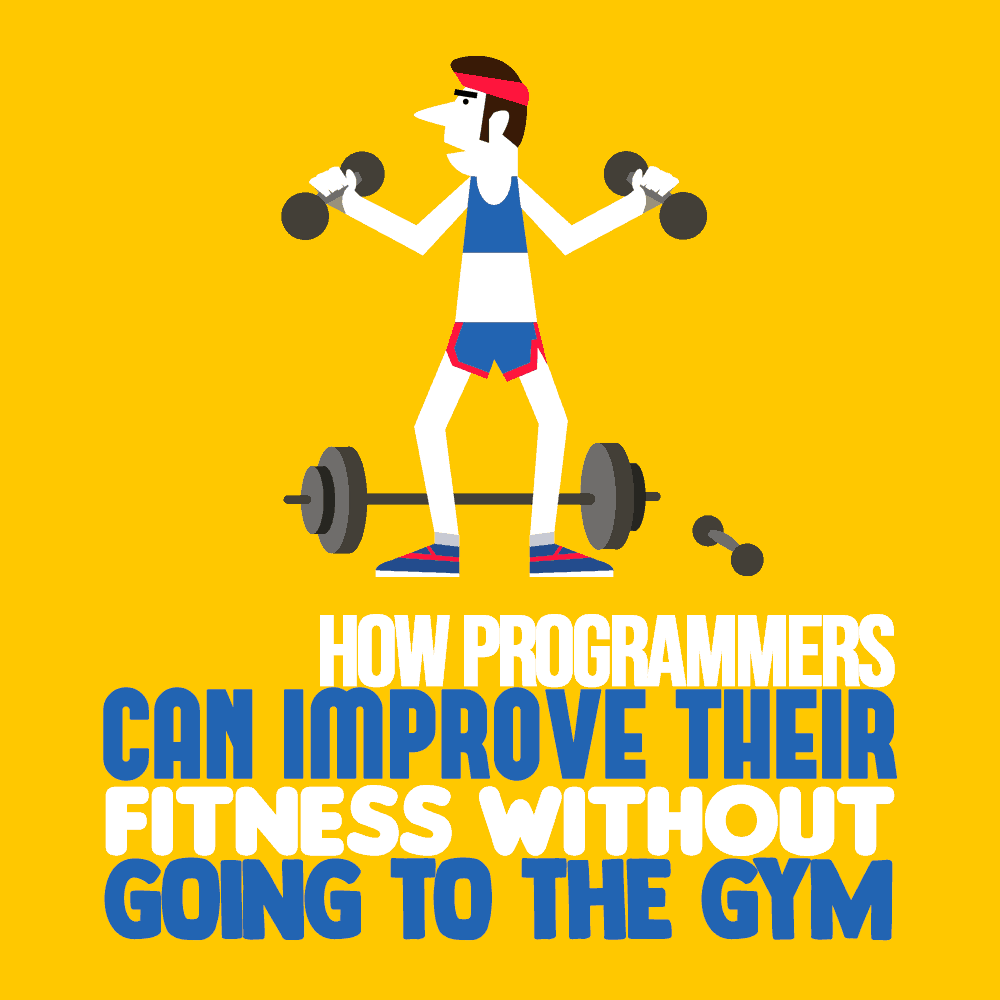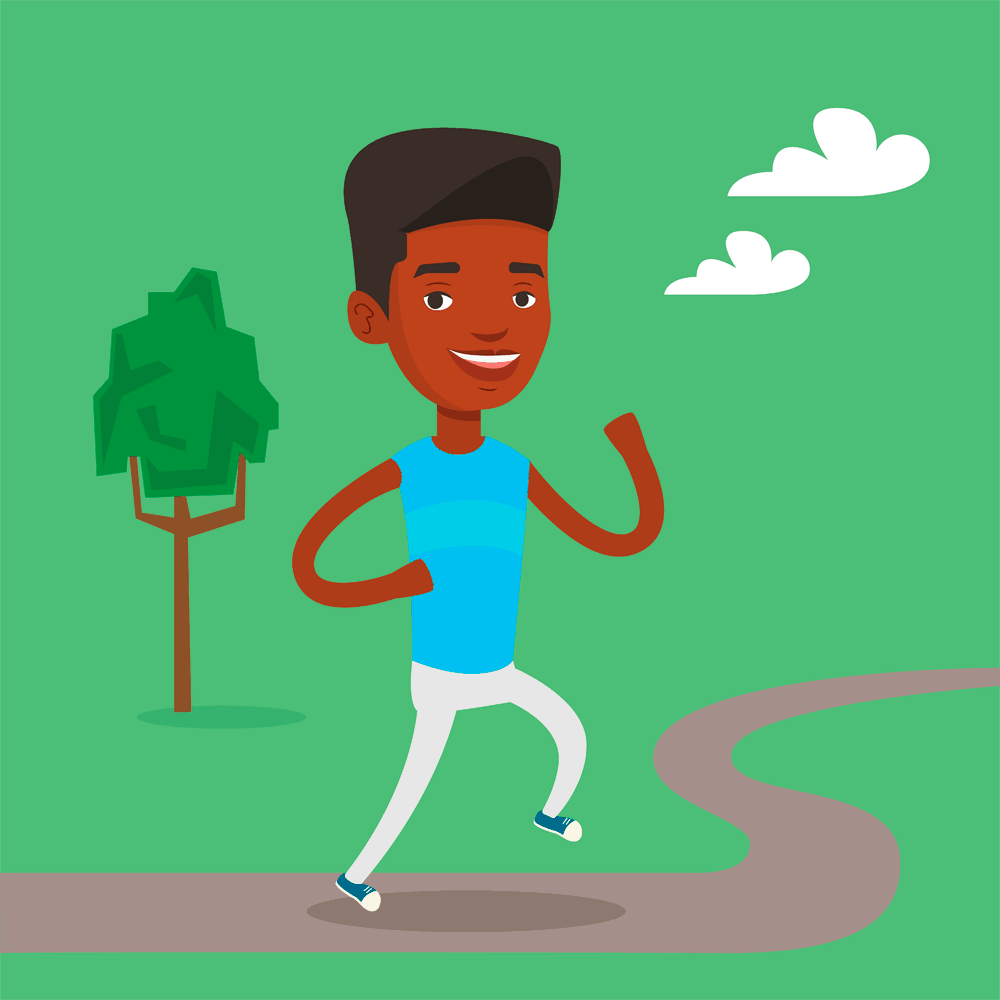
Fortunately, it’s easy to improve your health without making any drastic changes. A few small modifications to your daily programming routine can make a world of difference.
Lack of time is often cited as a reason to avoid exercise. If our job is stressful, and we have a lot to do, we may not feel we can afford to exercise. But a lack of activity can bring down your productivity, increase your stress, and lead to depression. By not taking the time to exercise, you can exacerbate your time-crunch problems.
The main thing is not to let your text editor trap you behind your desk. Breaking away, even for a few minutes, has certain health benefits. That slow trip to the kitchen for another cup of coffee isn’t dragging your feet, it’s improving your condition. Standing up and staring out the window? All positive.
With these tips, you can easily improve your fitness while working as a programmer.
Stand Up and Stretch Your Way to Better Health
Before we get to walking, I’d like to talk about something even easier for many of us: standing up.
It’s easy to lose track of time and stare at source code for hours on end. We may be deep into a problem or on a long knowledge crawl through tech forums. This flow can even override our internal needs, like drinking water and using the bathroom. Somehow, we’re quite capable of sitting for unhealthy lengths of time.
It needn’t be that way, though. I’m also a programmer, but I rarely sit for more than 30 to 60 minutes at a time, and, in the day as a whole, I have a lot of non-sitting time. I’m still being realistic, though; most of my time is spent sitting, but it’s significantly broken up. It doesn’t take much effort to make a habit of standing and still be productive and stay in the flow.
Start with the train or bus on your daily commute. Consider standing instead of sitting. Even if it doesn’t feel like an activity, it is improving your health. Extended periods of sitting are known to increase mortality, so take every opportunity you can to stand.
You might at first dislike it, and you’ll find your body complaining a bit. These are good signs that something is changing.
Think about all the ways you can stand during your day at work. If you’re on a phone call, stand up while you talk. Make sure your stand-up meetings are actually spent standing up. Try to make all short and impromptu meetings happen without chairs. If you have a question for a colleague, don’t send a message, but get up and ask them. It doesn’t matter if it’ll take only a minute or a few seconds. Standing up has positive health benefits.
If you’d like to experiment, try a convertible stand-up desk; they encourage standing, reduce pain, and can get rid of fatigue and discomfort. Perhaps you code best while sitting, but you can put your laptop up higher for other activities, like reading email. Try sitting on a yoga ball, or placing a wobble cushion ball on your chair.
All of these minor variations are low-effort, but give your body a profound amount of extra movement. Alternating standing and sitting will improve your health, especially if you’re overweight.
Try office yoga. Do a short search and look at the numerous stretches and motions you can do behind your desk or in the hallway at work.
Are you worried about how this looks, and perhaps embarrassed? This is, unfortunately, an image we need to change in society. Being active, not inactivity, should be seen as the norm. But is it really a problem? What would you think if your colleague stood up and started stretching? A bit of peer pressure might help get a trend started. That would lead to a healthy office that embraces standing as part of their culture.
In any case, even a bit of slight social discomfort is far better than the permanent long-term trouble of diabetes, stroke, heart disease, and a host of other ailments that long periods of sitting can lead to.
At first, you may not have the will to do office yoga, but stand up anyway. The mere act of interrupting your sitting has positive health effects.
Take Another Step and Start Walking
We all have to get places. How we get there can make a significant impact on our health.
Adding more walking to your day can help you reduce weight, build muscle, and improve cognitive abilities. Walking is a low-impact exercise that puts little stress on the body. It requires no special equipment, no warm-up, no planning, and for most of us, it has no downsides.
Most of us don’t live close enough to work to be able to walk there. But consider getting off a station earlier, or parking your car in a lot farther away. You don’t need to walk an hour to your office, but adding five to 10 minutes is beneficial.
Additionally, this strategy improves your transit options by creating a larger destination area. In some cases, this can decrease the time it takes to get to the office.

Lunch is another prime opportunity to add some walking to your schedule. Avoid ordering delivery, and weather permitting, go outside to eat. Preferably pack a lunch or buy something that allows you to walk and eat at the same time.
If you must sit, then find somewhere far enough away to require some walking, and eat there. Somewhere with trees is nice, as nature has been shown to make us happier. Lunch is a great time to have a change in our scenery and take a significant break from sitting.
Walking has numerous psychological benefits. It calms you down, reduces stress, and gives you the clarity you need to tackle code again. One study even shows these benefits happen with as little as 12 minutes of walking.
If you’re unravelling a nasty bug or some code is frustrating you, going for a walk may be the best way to address the issue. In no way is this slacking off, or not being dedicated. It’s the exact opposite. The best tool we have is not our integrated development environment (IDE), but our brain. And refreshing that tool, our mind, is a highly rational choice when facing difficulty. As a bonus, it’s possible we can even solve the problem while not actively thinking about it.
If you wish to push it further, consider intermittent fasting. This is the next simplest choice for improving your lifestyle. It’s easy to achieve, and intermittent fasting can compound the benefits of walking.
Every Little Step Improves Your Health
Often, we’re discouraged from doing something if we don’t think we have time to do anything that will make a meaningful difference. It’s like those bugs we’re afraid to tackle because we believe they’ll take too long. We think those little bits of desk yoga, or the walk around the office building, aren’t useful. This couldn’t be further from the truth.
Small amounts of activity have a positive effect. Even something as simple as a five-minute walk every three hours can reduce cardiovascular risk and improve cognitive abilities.
Evidence indicates that any amount of activity helps, with the effects being cumulative. Consider it like cleaning the code, one line at a time. There’s no need to worry about a short amount of time being ineffective; instead, take what time you can. The American Heart Association is also confident on this point, indicating that all those little bits of exercise over the day add up.
Standing up is beneficial on its own. The more often you do it, the better. If that’s all you can manage now, then go with it. Don’t be discouraged if you’re finding it difficult to get out and walk. Whatever you manage will improve your situation.
Perhaps, as time goes on, you’ll find it easier to add more activity. You will soon feel the benefits of those mental and physical breaks.
Now, stand up, go to the nearest person, ask them to stand up, and talk about this article. It’ll literally improve your health.
